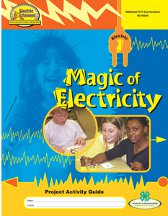The Electric Excitement series comes from the National 4-H Council. See my general overview of 4-H curriculum guides here.
For the Electric Excitement series, as with others, a homeschooling parent can serve as a helper, but some prior familiarity with electricity and circuits is likely to be helpful.
The Electric Excitement series consists of four self-contained Project Activity Guides in progressive order of difficulty. Older students with no prior knowledge can be begin with Level 1. The guides and their suggested grade levels are:
Magic of Electricity (Level 1), grades 4-5
Investigating Electricity (Level 2), grades 6-7
Wired for Power (Level 3), grades 8-9
Electronics 1 (level 4) grades 10-12
I reviewed Level 1, Magic of Electricity, but other guides are similar in design. Magic of Electricity has 14 lessons, and all except the first two lessons begin with an experiment. (The first two lessons lay the groundwork and direct students in obtaining their own supplies.) Students begin by building a simple circuit with a battery, a light bulb, and aluminum foil, but by the time they reach Lesson 14, they will be able to build a small motor. Along the way they learn about different types of circuits and magnetism, and they also build a compass and an electromagnet.
Materials required should be relatively easy to find. Some items such as nails, string, tape, and Styrofoam cups are likely to be on hand already, but they will probably need to purchase items such as battery holders, light bulb holders, insulated wire, copper wire, and flash light bulbs. A Materials Kit for Level 1 has resources for five students. If you've got a group class, this might be a good investment.
All four guides follow the 4-H experiential learning model described in my overview. For the Electric Excitement series, there are additional optional “research” activities such as to research different sizes of batteries and their uses and report to the helper what they discover.
At the beginning of a lesson, students are frequently encouraged to figure out how to make something work given only certain materials to work with. If they get stuck, they can look ahead to the step-by-step instructions. This makes students at least attempt to think creatively about how to accomplish a given task. Unlike some experiment books, these guides include extensive explanations of how and why things work so that students build knowledge with broader usefulness.
Some activities in the guides include charts or fill-in-the-blanks lines for students to complete, but they should also keep a journal for recording other information such as their own hypotheses that they will test, experiments, written responses, and research.
4-H requires leadership and presentation activities in addition to completion of a certain number of projects form a guide. Two pages at the front of the book provide planning and record-keeping pages for students who want to complete those requirements. A guide for the series, Electric Group Helper’s Guide, might be helpful, but it seems to me that it while it is very useful for a group class, it isn’t essential for homeschoolers working individually or within the family.
There are other experiment books on magnetism and electricity, but it’s hard to beat 4-H’s combination of high-quality learning material at very low prices.









